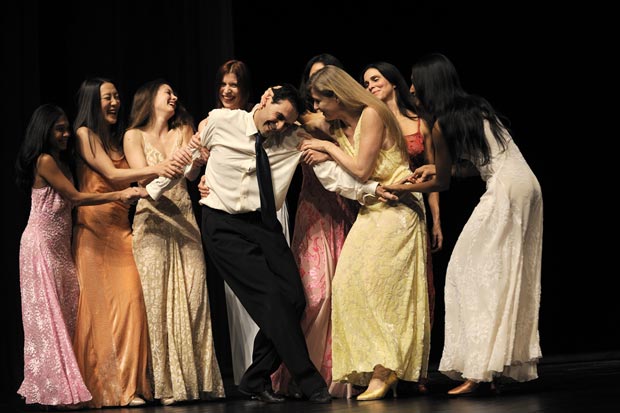
Tanztheater Wuppertal Pina Bausch
World Cities 2012: Nefés
London, Sadler's Wells
24 June 2012
www.pina-bausch.de
World Cities 2012 details
DanceTabs reviews of World Cities 2012 performances
Pina Bausch and her designer, Peter Pabst, appear to have thrown in the Turkish towel when it came to the company’s evocation of Istanbul. Maybe they were overwhelmed by the overlay of cultures, past and present. Istanbul, formerly Constantinople, straddles an earthquake fault line, divided by the Bosphorus between Europe and Asia; it teems with people and traffic on the roads, bridges and water.
In Nefés, brief video images of rush-hour congestion and serene sea occupy huge gauzes in the black-box set, but most of the 2 hours and 50 minutes of action take place on a bare stage. Mysteriously, water seeps upwards to form a pool; a shower falls sharply towards the end of the first half. The soundscape is soothing, a collage of traditional and modern Turkish music and Western burblings.

Bausch must have decided the irresistible place to begin was in a Turkish bath house. Fernando Suels Mendoza mugs at the audience, shouting ‘This is ME in the hammam’ as a prone body is slapped. Towel-clad men are joined by a chorus of jewel-gowned women, brushing their long hair downwards in unison over their heads as though whipping or drying the men. It’s an arresting stage picture, repeated later in a variation of the hammam scene.
On the whole, even when they’re being compliant, the women are having fun; the men less so. The women are able to be assertive in solos, expressing their personal qualities. Ditta Miranda Jasjfi is a diminutive sorceress, flapping her hands, wriggling her hips, bounding and squatting, following her own powerful internal rhythms. Fuzzy-haired Cristiana Morganti is bold and brash, Nazareth Pandero a mighty handful: ‘I am too fat for you’, she cackles at a would-be suitor, before launching into a semi-grotesque Ausdruckstanz solo.
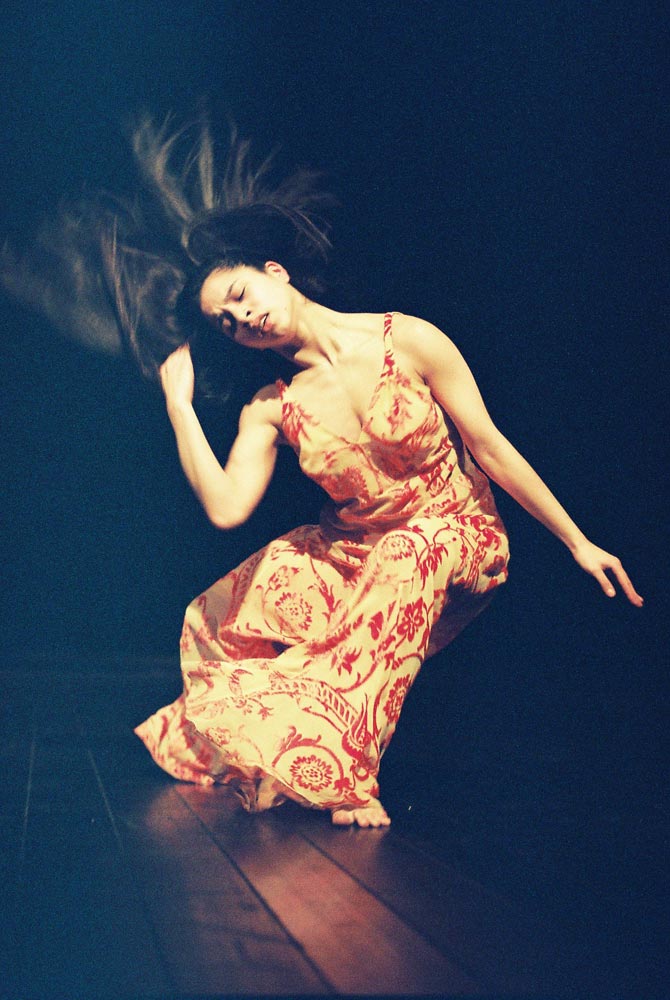
Graceful Shantala Shivalingappa is first seen balancing two bags of water suspended on a pole on her head, while two men support her feet in aerial walking. Later she performs an Indian classical dance to Western jazz, interrupted by men lifting her as she carries on, unperturbed. An admired kuchipudi dancer, Shivalingappa was guesting with company in London before performing a one-woman show at the Joyce Theatre in New York.
Beautiful and talented as she is, Shivalingappa exemplifies a problem with Bausch’s later pieces. Because the dancers were encouraged after each city residency to bring their own ideas and ways of moving for Bausch to edit, each solo proclaims ‘This is who I am’. Then the dance ends. After a while, you long for a response, a development into a duet or a trio – something more than a woman being carried off like an object. Or being replaced by yet another soloist.
Every now again there is a welcome follow-through. As Shivalingappa begins another kuchipudi solo in the second half, Michael Strecker hovers beside her, putting a little glass in her hand, over and over. The give-and-take is both impersonal and tender. When she finally keeps the glass, he launches into a frantic courtship dance to impress her. She smiles in delight and runs about as he becomes ever more extravagant. Then they walk off together. That’s it.
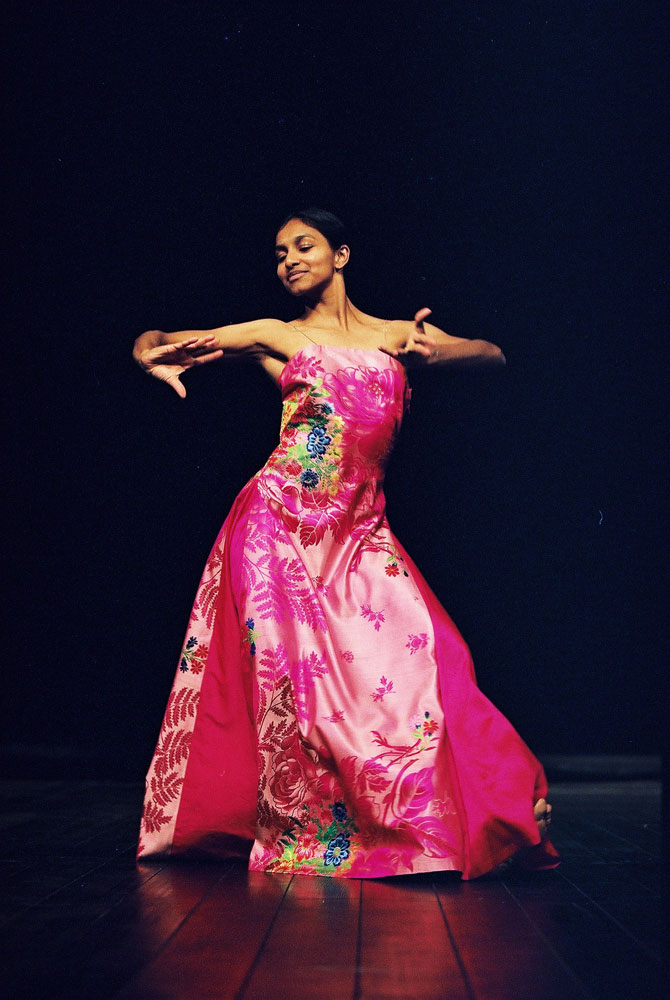
The default mode for most of the male solos is non-specific anguish and frustration, sometimes expressed through modern-dance swirls and contractions, sometimes through jagged street moves. Intense Damian Ottavio Bigi writhes and twitches spectacularly as though drugged by a poisonous-looking drink he is obliged to swallow. The men link together to treat the women either as things to be lugged about like rolled-up carpets or as gorgeous creatures to be adored. They fan the girls’ long skirts and steal kisses by parting the manes of hair hanging over their faces.
There are charming vignettes: a stolen moment of Turkish delight, a hands-off massage, a ferrying of drinks across the pool of water. A few big set-pieces: the hammam, a farewell picnic, a noisy cocktail party. And a memorable ending, part folk-dance, part défilé, recalling the winding entry of the bayaderes in the Kingdom of the Shades scene. ‘Bring back the old days again’ sings husky Tom Waits as the men progress across the front of the stage linked in a sitting position, one knee raised, one hand extended, and the women undulate in lines upstage. The friendly finale is Bausch’s testament to the enduring pleasures of Turkish hospitality.






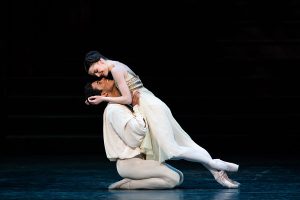
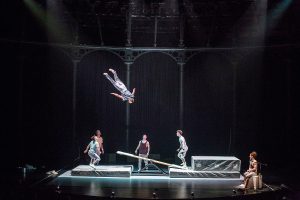



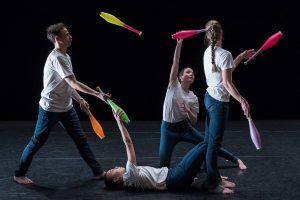

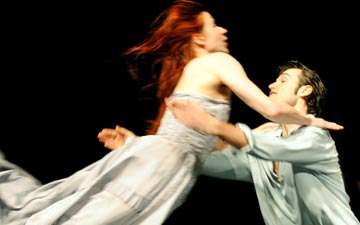


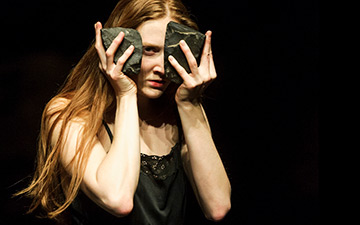
You must be logged in to post a comment.